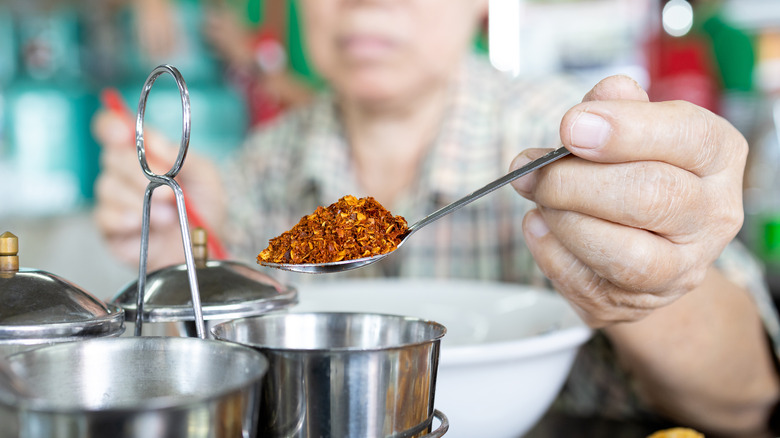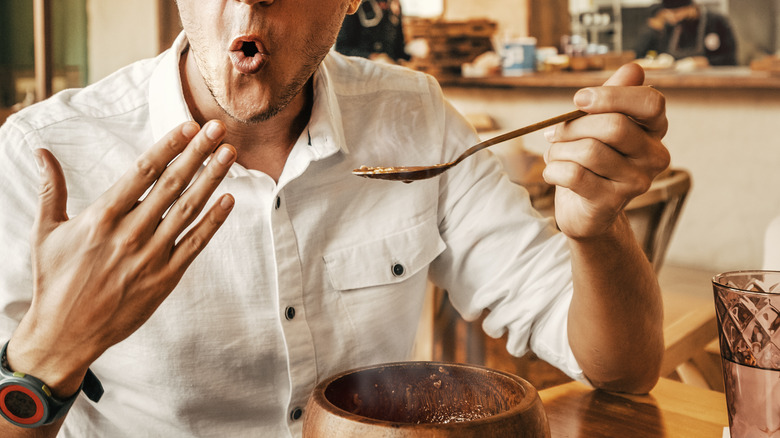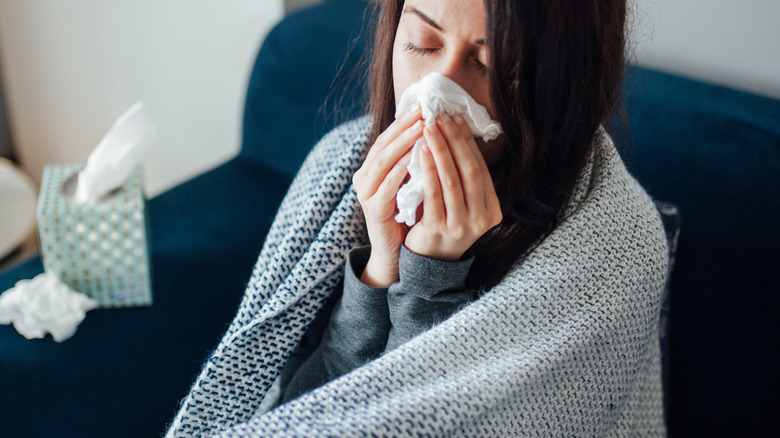Can Eating Spicy Food Cure The Common Cold? What To Consider
For any self-professed spicy food aficionado, a meal would never be complete without a dash or two of the hot stuff. And while eating spicy food certainly isn't for everyone, a considerable number of people across the globe find joy in every spice-filled bite. Some may even be doing it not just because they enjoy the burning sensation in their mouths, but also for the evidence-backed benefits of eating spicy foods.
In a 2019 study in the Journal of the American College of Cardiology, researchers studied the chili pepper eating habits of 22,811 Italian adults, and observed that people who had at least four spicy meals per week had a lower risk of dying versus folks who avoided the spicy stuff. 2015 research involving almost half a million Chinese adults (via the BMJ) supported this finding; according to scientists, eating spicy foods on a daily basis meant a 14% reduced risk of death compared to folks who consumed spicy foods less than once a week. In addition, eating spicy food may give your metabolism a boost, fight inflammation in the body, boost your body's defenses against bacteria, and possibly even hinder the development of cancer cells (per Healthline).
But is it true that eating spicy foods is the secret to getting better when you have a cold? After all, some people seem to believe that spicy food consumption can help them get rid of the sniffles. As it turns out, the truth is a bit more complicated.
Spicy foods can help with cold symptoms
According to GoodRx, the spices we add to our food contain capsaicin, an active chemical that produces a burning sensation when it comes into contact with the tongue and taste buds. Regardless of the method of preparation — whether cooked, uncooked, or simply dried — consuming capsaicin-rich foods like chili peppers allows the body to benefit from them.
In an interview with TIME Magazine, Dr. Brett Comer, a surgeon and ear, nose, and throat specialist from the University of Kentucky College of Medicine, explained that consuming food at a certain level of spiciness can cause increased production of fluid not just in your eyes, nose, and mouth, but even all the way down to your digestive and excretory systems as well. "When your mouth or throat encounters any foreign object that's noxious, the thinking is that liquid helps to move that out." Comer added that at times, the amount of mucus that finds its way into the gastrointestinal tract may be enough to cause stomach issues for some people.
For the same reason, eating spicy food while you have a cold can actually help ease your symptoms. As Rochester Regional Health explains, the capsaicin in your spicy food can both break up mucus in your respiratory system and boost its production. This can help relieve your sore throat and cough, but can also lead to more mucus running down your nose (and you sweating buckets).
But spicy foods do not cure the common cold
Unfortunately, the relief that eating spicy foods can bring to someone experiencing cold symptoms likely caused the incorrect belief that it can actually solve the person's predicament. While eating spicy food during a particularly nasty bout of the common cold can help you feel a lot less awful, it won't cure you. In fact, as you've likely already heard from your science teachers, there is no cure for the common cold.
According to Scientific American, experts have been searching for a cure since the middle of the 20th century, but have yet to succeed. As Edinburgh Napier University immunologist Peter Barlow explained, in order to develop a cure for the rhinoviruses that cause the cold, scientists need to figure out how to deal with every single type — and there are at least 160 of them. "The main challenge with rhinovirus is the number of circulating strains ... [i]t's incredibly difficult to create a vaccine or drug that will target all of those 160 [strains]." In simpler terms, it's like creating a key that opens 160 (possibly more) locks.
The good news, of course, is that the common cold tends to go away after a week or so, with rest and proper nutrition (per Mayo Clinic). So feel free to indulge in the spicy stuff when you have a cold; it won't cure you, but it will help you (or at the very least, your taste buds) feel better.


